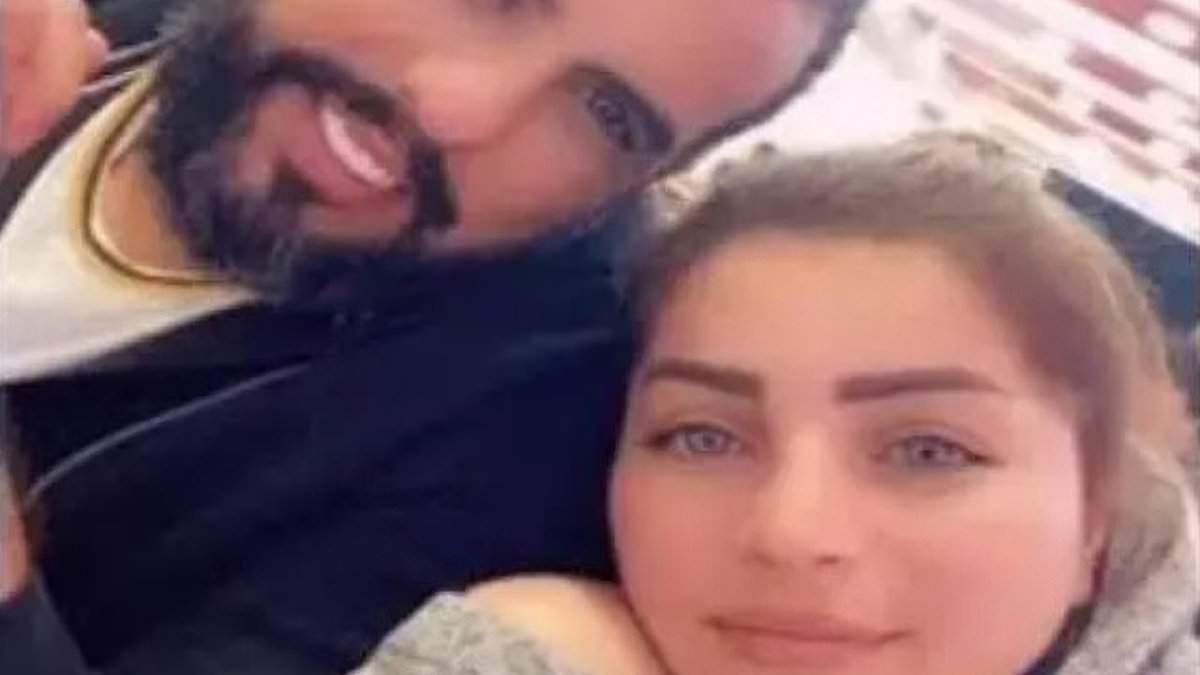A Lebanese man accused of murdering his beauty queen wife fled to Britain on a small boat, the Mail can reveal.
Ibrahim Ghazal, 36, allegedly suffocated model Zeina Kanjo to death in Beirut and is subject to an Interpol red notice.
But he was able to spend years zig-zagging across Europe before becoming one of the record 23,000 arrivals by small boat into Britain from France this year.
The alleged killer was last week jailed for nine months for attempting to arrive without a valid entry clearance.
But Government officials face a potential crisis over what to do with him once his sentence has expired.
Ghazal has already successfully escaped extradition from Germany and Sweden under Human Rights laws by claiming he faced execution if returned home, and it is feared he could do the same to avoid leaving Britain.
Shadow home secretary Chris Philp said the shocking case showed the Government had no control over the migrants entering Britain.
‘And we know that the illegal immigrants arriving are from nationalities 24 times more likely to end up in prison, especially for sex offences,’ he added.
‘Every illegal immigrant should be immediately deported upon arrival – then the crossings would soon end.’
Ms Kanjo’s murder in January 2021 sparked outrage in Lebanon and ignited a national debate about domestic violence issues facing women in the middle eastern nation.
The 33-year-old model, who represented her country in a beauty contest in Egypt the previous year, had filed domestic violence and fraud cases against her new husband and was trying to divorce him when he allegedly killed her.
Just hours after her death, Ghazal fled to Turkey and Lebanese channel Al Jadeed broadcast an audio recording in which he appeared to admit responsibility.
In a conversation with Ms Zeina’s sister, he allegedly said: ‘I didn’t want to, I didn’t want her to die, when she was screaming, I just put my hand on her mouth.’
Ghazal embarked on a journey across Europe, travelling through countries including Greece, the Netherlands and Luxembourg.
He evaded arrest until December 2022 when he was detained in Stockholm under Interpol’s red notice.
Extradition was denied due to Sweden’s refusal to send a suspect to a country where they may face execution, and when Ghazal was arrested again in Germany the same thing happened, according to Ms Kanjo’s lawyer, Ashraf Al-Moussawi.
‘The Swedish and German authorities required amendments to these laws as a condition for extradition, which wasn’t feasible,’ Mr Al-Moussawi said.
‘But in reality, Lebanon hasn’t carried out an execution since 1994, so it shouldn’t have been an obstacle.
‘Following the government’s refusal to amend the law and the expiration of his detention in Sweden, he submitted a humanitarian asylum request, which was under review when he was released. ‘He then wandered Europe until his recent arrest in England.’
Mr Al-Moussawi urged the British government to find a way to send Ghazal back to Lebanon to face justice.
Ms Kanjo’s heartbroken father, Mohammed, said he had little faith in the Lebanese justice system, however, and claimed that while on the run Ghazal had been able to sneak back into the country to attend his cousin’s wedding a year after his daughter’s death.
‘After all this time, I’m left wondering if justice will ever be served,’ he told the Mail.
‘It’s like something is missing from your body, something that is not replaceable.
‘I honestly hope he’s not handed over to Lebanese authorities only to be imprisoned and then released again.
‘Perhaps the British legal system will find a way to properly punish him.’
Barrister Toby Cadman, an international criminal law specialist, said Britain may be able to extradite an individual to a country that has the death penalty if there are assurances the suspect will not face execution.
‘It would be the same as when we send someone back to the US, where the death penalty still applies in some states,’ he said.
‘We have to receive a proper assurance that the death penalty won’t be applied, and that various other conditions are met.’
Ghazal was detained by the Border Force and was jailed by judge Ian Lawrie KC at Gloucester Crown Court last Wednesday after admitting entering the country unlawfully.
A Government spokesman said: ‘The Home Office never comments on whether extradition requests have or have not been received, and it is also our longstanding policy not to comment on individual cases.
‘However, we will always do everything in our power to remove serious foreign criminals from the UK so they are not left free on our streets after completing their sentence.’
Shadow justice secretary Robert Jenrick said the case showed the Government needed to wake up to the crisis in the Channel.
‘We have seen terror suspects, murderers, rapists and drug dealers saunter into the country and jeopardise the safety of the British people,’ he said.
‘This is nothing less than a national security emergency.
‘The public couldn’t care less about outdated international treaties and when the safety of their communities – of their own children and loved ones – is at stake.’
